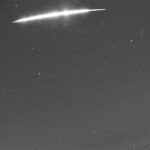Abstract: A summary of the activity of the CAMS BeNeLux network during the month of October 2019 is presented. October 2019 had exceptional poor weather conditions. Despite the uncooperative weather a total of 3344 orbits were collected during this month.
1 Introduction
October is one of the best months of the year for meteor observing. However, weather in autumn in the BeNeLux region tends to be rather unstable. October 2019 would be the 8th month of October since the CAMS BeNeLux network has started in 2012. For instance, a good coverage of the Orionids might be most interesting. Would this be possible in 2019?
2 October 2019 statistics
CAMS BeNeLux experienced exceptionally poor weather circumstances in October 2019. Still 3344 orbits could be collected which is far less than the 9611 orbits obtained in 2018. In 2018 we were exceptionally lucky with many clear nights and the Draconids outburst as a bonus. This year, the exceptional dry weather of previous months suddenly changed into a cloudy and rainy weather pattern. This month counted 11 nights with more than 100 orbits. The best October night was 27–28 with as many as 518 orbits in a single night. Only two nights remained without any orbits. The statistics of October 2019 are compared in Figure 1 and Table 1 with the same month in previous years since the start of CAMS BeNeLux in 2012. In 8 years, 199 October nights allowed to obtain orbits with a grand total of 25485 orbits collected during the month of October during all these years together.
Some CAMS stations were not operational due to technical problems or other reasons. October 2018 had a maximum of 82 cameras, 73.0 on average available while October 2019 had 76 cameras at best and 67.5 on average. The impact of the exceptional poor weather resulted in about the same number of orbits as in October 2016 when at best 54 cameras and on average 41.3 cameras were available.
A favorable weather for the Orionids did not happen in 2019. Stable clear nights during the Orionid activity happened the last time during the testing period of CAMS in the BeNeLux after the Draconid 2011 project, months before the official start of the CAMS BeNeLux network. Anyway, unfavorable weather ruined weeks or months of observing time every now and then. The CAMS BeNeLux weather pattern is known for its rather astronomy unfriendly character. In fact, it is remarkable that CAMS BeNeLux overall managed to collect so many orbits.

Figure 1 – Comparing October 2019 to previous months of October in the CAMS BeNeLux history. The blue bars represent the number of orbits, the red bars the maximum number of cameras running in a single night and the yellow bar the average number of cameras running per night.
Table 1 – October 2019 compared to previous months of October.
| Year | Nights | Orbits | Stations | Max. Cams | Min. Cams | Mean Cams |
| 2012 | 16 | 220 | 6 | 7 | 3.9 | |
| 2013 | 20 | 866 | 10 | 26 | 16.8 | |
| 2014 | 22 | 1262 | 14 | 33 | 19.7 | |
| 2015 | 24 | 2684 | 15 | 47 | 34.8 | |
| 2016 | 30 | 3335 | 19 | 54 | 19 | 41.3 |
| 2017 | 29 | 4163 | 22 | 87 | 45 | 74.4 |
| 2018 | 29 | 9611 | 21 | 82 | 52 | 73.0 |
| 2019 | 29 | 3344 | 20 | 76 | 47 | 67.5 |
| Total | 199 | 25485 |
3 Conclusion
October 2019 was a rather poor month for CAMS BeNeLux because of the unfavorable weather circumstances during most nights.
Acknowledgment
Many thanks to all participants in the CAMS BeNeLux network for their dedicated efforts. Thanks to Carl Johannink for providing all the data on which this report is based. The CAMS BeNeLux team was operated by the following volunteers during the month of October 2019:
Hans Betlem (Leiden, Netherlands, CAMS 371, 372 and 373), Jean-Marie Biets (Wilderen, Belgium, CAMS 379, 380, 381 and 382), Martin Breukers (Hengelo, Netherlands, CAMS 320, 321, 322, 323, 324, 325, 326 and 327, RMS 328 and 329), Guiseppe Canonaco (Genk, RMS 3815), Bart Dessoy (Zoersel, Belgium, CAMS 397, 398, 804, 805, 806 and 888), Jean-Paul Dumoulin and Christian Walin (Grapfontaine, Belgium, CAMS 814 and 815, RMS 003814), Luc Gobin (Mechelen, Belgium, CAMS 390, 391, 807 and 808), Tioga Gulon (Nancy, France, CAMS 3900 and 3901), Robert Haas (Alphen aan de Rijn, Netherlands, CAMS 3360, 3361, 3362, 3363, 3364, 3365, 3366 and 3367), Robert Haas (Texel, Netherlands, CAMS 810, 811, 812 and 813), Robert Haas / Edwin van Dijk (Burlage, Germany, CAMS 801, 802, 821 and 822), Klaas Jobse (Oostkapelle, Netherlands, CAMS 3030, 3031, 3032, 3033, 3034, 3037, 3038 and 3039), Hervé Lamy (Dourbes, Belgium, CAMS 394 and 395), Hervé Lamy (Humain Belgium, CAMS 816), Hervé Lamy (Ukkel, Belgium, CAMS 393), Koen Miskotte (Ermelo, Netherlands, CAMS 351, 352, 353 and 354), Tim Polfliet (Gent, Belgium, CAMS 396), Steve Rau (Zillebeke, Belgium, CAMS 3850 and 3852), Paul and Adriana Roggemans (Mechelen, Belgium, CAMS 383, 384, 388, 389, 399 and 809, RMS 003830 and 003831), Hans Schremmer (Niederkruechten, Germany, CAMS 803) and Erwin van Ballegoij (Heesch, Netherlands,CAMS 347 and 348).







